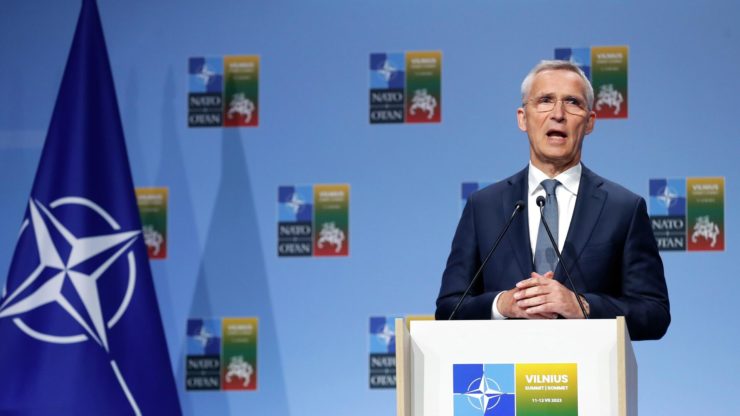
Following French President Macron’s remarks about sending NATO troops to Ukraine to fight Russia, shadows of a wider conflict in Europe are looming large. If that happens, it will be a conflict triggered by Washington’s obsession with expanding NATO to include Ukraine and the subsequent inability of the combined NATO forces to defeat Russia and/or beat it into negotiations – a failure that is now reinforcing European states’ fear of Russian dominance (another Washington narrative) in Europe, which is further prompting them to contemplate a wider war as a survival strategy. The purpose of expanding this war is the same as that justified a war on Russia via Ukraine, i.e., to destroy the Russian economy, create widespread social and political instability, and ultimately provoke a regime change. So, with NATO’s supply of weapons and training of Ukrainian forces having failed to achieve this objective, NATO is now gearing up to do it directly. It is already doing a major exercise (“Steadfast Defender”) that involves all NATO countries.
Of course, this is easier said than done. For instance, many NATO countries, i.e., Germany, Poland, and Sweden, have opposed sending troops to Ukraine. German Chancellor Olaf said – basically, contradicted Macron – when he said that there was an agreement that NATO troops will not be sent to Ukraine. This was reiterated in the wake of Russian President Putin’s warning that if Russian statehood was threatened, Russia will be willing to use the nuclear option. This warning was expressed, not in some response to a journalistic question, but in a speech that Putin delivered to the Russian Federal Assembly, which indicates its seriousness and Putin’s efforts to take the Russian political elite into confidence about it. That seriousness had the effect of piercing through NATO’s war drum, forcing many NATO countries to immediately take a step back and rethink.
Sure, many NATO countries possess nuclear capability, and they can use it to deter Russia. But even the specter of a wider (nuclear) war in the region also means that many of these countries will have to increase their defence spending. Donald Trump recently said that, if he becomes the US president and if NATO members are not spending their due part, the US would probably not abide by the NATO charter, article 5 of which says that all NATO countries will contribute if a member state comes under attack.
Now, if these NATO countries support sending NATO troops to Ukraine, it will inevitably raise the cost of the war, which means that these countries will either have to spend 2 percent of their GDP on defence and/or see the alliance falling apart. Opposing sending troops to NATO, therefore, makes sense also because of the anticipated return of Donald Trump to the White House. NATO states don’t want to take a plunge into a crisis that they may not be able to fund, due to the ongoing cost of living economic crisis in the whole European continent, and that may just push the Trump-led US away from the alliance, further weakening it against Russia.
As the data shows, only 11 NATO countries spend 2 or more than 2 percent of their GDP on defence, while a majority of these states, including France, don’t. This division is not coincidental. Geopolitical considerations shape it.
While the US spends a huge amount on defense, it is due mainly to the fact that it sees itself as a global power capable of deploying hard military power across the world. But not every NATO country has this vision. For instance, NATO countries that are geographically located close to Russia, such as Poland, spend more on defence because of their specific threat perceptions. But other NATO countries, such as France, Spain, Canada, etc., spend less than 2 percent because of the geographical distance between them and Russia – something that produces a different sort of threat perception vis-à-vis Russia. In fact, this threat perception has not changed ever since 2014 when Russia established its control of Crimea. Between 2014 and 2023, many NATO countries, such as France, Norway, Denmark, Germany, Italy, etc., have not increased their defence spending.
So, with a majority of NATO countries not spending enough on the alliance means that the alliance cannot fight a long war. Thus far, NATO has only fought short wars, such as that in Libya. In Afghanistan, where it did fight a long war, it was the US primarily that fought it – and failed to achieve its objectives. Some in the alliance realize this.
For instance, Admiral Rob Bauer of the Royal Netherlands Navy, NATO’s most senior military commander and military adviser to its North Atlantic Council, said in October last year that “We need large volumes. The just-in-time, just-enough economy we built together in 30 years in our liberal economies is fine for a lot of things – but not the armed forces when there is a war ongoing”. The reason for this is that NATO’s strategy is known as a “come as you are” war, which means it can fight only so far as supplies keep flowing, which depend upon the member countries’ budgets, which many are not willing to, or cannot, increase. It is due to this factor that NATO prefers a strategy that can bring any war to a quick conclusion.
But when it comes to fighting a super-military-power such as Russia – which does have nuclear capacity – quick conclusions are not realistically conceivable. Most NATO countries understand this based on their experience of the ways their consistent support for Ukraine has failed to bring even a semblance of any meaningful change towards regime change, let alone defeat Russia militarily.
Salman Rafi Sheikh, research-analyst of International Relations and Pakistan’s foreign and domestic affairs, exclusively for the online magazine “New Eastern Outlook”
